Iran Says US 'In No Position' To Talk About Human Rights
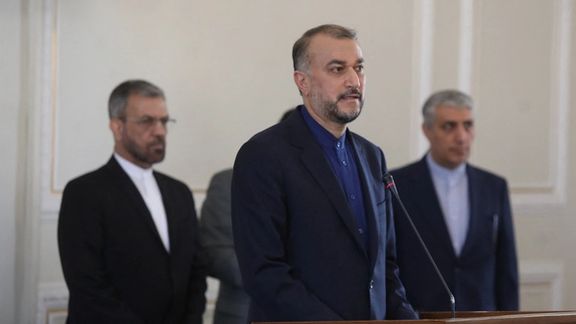
Iran’s Foreign Minister Hossein Amir-Abdollahian has said that the United States is in no position to even speak about human rights.

Iran’s Foreign Minister Hossein Amir-Abdollahian has said that the United States is in no position to even speak about human rights.
In a tweet on Tuesday, Amir-Abdollahian said as a result of Washington’s “interventionism” two million people have been “slaughtered” in Iraq, Afghanistan, Yemen and Syria, and the United States is also “enflaming the fire of the Ukrainian war”.
“Stop hypocrisy. The great nation of Iran knows well the malevolence behind nice-sounding words,” he added.
His comments come after US State Department Spokesman Ned Price said Monday that the US is united with its allies and partners in the need to confront Iran’s leadership for its human rights abuses and destabilizing activities.
Islamic Republic’s foreign minister claimed that the White House still insists to hold direct negotiations with Iran. “If there is a serious will on the other side, we believe an agreement would be attainable,” he said at a meeting at the foreign ministry.
Referring to anti-government protests, Amir-Abdollahian said Monday that the Americans realized earlier than the three European countries that nothing special has happened and will not happen in Iran.
The United States has openly stated that its “focus” now is on “the remarkable bravery and courage that the Iranian people are exhibiting through their peaceful demonstrations”, and the EU has come up with new sanctions on Tehran.
The unrest in Iran after the death of Mahsa Amini have garnered strong sympathy around the globe. At the same time Iran’s unwillingness to compromise on the nuclear issue persuaded the US to adopt a tougher position toward Tehran.
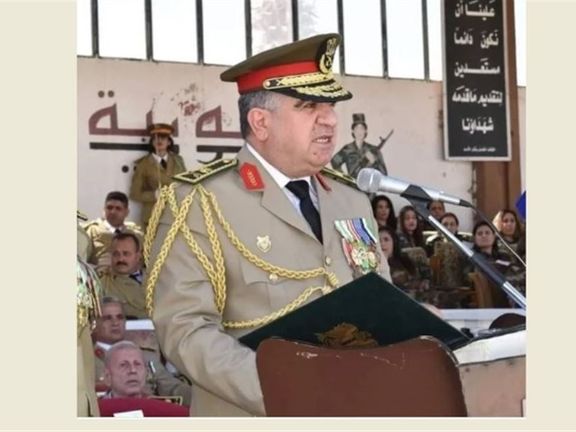
In a meeting with the Syrian defense minister, Iran’s President Ebrahim Raisi has said the Islamic Republic is ready to help Damascus financially in rebuilding the country.
Raisi also described the relations between the two countries as strategic stating that Iran will always stand by Syria.
“The Islamic Republic of Iran is a true friend of the Syrian nation because it stood by the Syrian nation and government during the period of resistance against terrorism and is ready now to stand by them during the reconstruction period by boosting all-round economic cooperation,” Raisi told the Syrian minister Ali Mahmoud Abbas.
The comments by Raisi comes at a time when Iran is facing one of its most severe economic crises with the national currency at a historic low, with tens of millions hit by unexpected poverty.
Meanwhile, in a separate meeting, Commander of the Revolutionary Guard Hossein Salami told the Syrian official that Tehran is ready to help Bashar al-Assad’s armed forces in the required fields.
On Monday, Chairman of the Chiefs of Staff of the Iranian Armed Forces Mohammad Bagheri also expressed the Islamic Republic’s willingness to help the Syrian military in restructuring, training, and supplying equipment. He further stressed the need for staging a joint military wargame by Iran and Syria.
The extent of Iranian military expenditures and financial aid to Syria to keep President Bashar al-Assad in power is not known, but by some estimates Tehran has spent more than $30 billion over the last decade to support Assad’s regime.
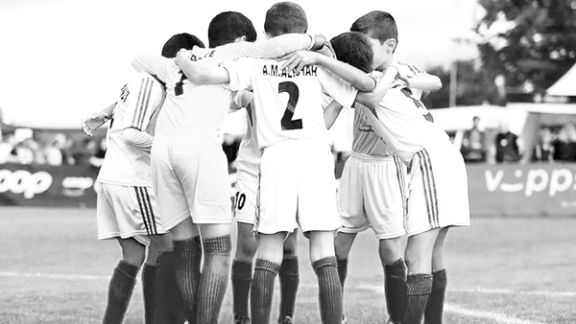
Despite the efforts of Iran’s sport ministry to downplay the sexual abuse of 15 teenage football students, a copy of the complaint letter of the parents shows the ministry was aware of the incident for 3 weeks.
The letter published on social media indicates that the parents of the abused kids had informed the ministry about the tragic event before the issue became public.
A former media manager for the Shahr Khodro football team in the northeastern city of Mashhad said on social media that the parents of 15 kids practicing with the club have filed a complaint against the club and coaches for sexual assault on their children, reported IRNA Friday.
Shahrara daily, which is affiliated to Mashhad municipality, reported Friday that “families of the children had gathered in front of the headquarters of the provincial football organization to protest this tragedy.”
Minister of Sports, Hamid Sajjadi claimed Monday that the ministry will continue its follow-ups to find out what had originally happened.
“There was no complaint about the issue. Only two or three objections were received by the Ministry of Sports. We intend to make a conclusion and final decision after the necessary probes,” he added.
It is not clear why the parents have not gone to the police against the unnamed coach accused of the abuse.
On the other hand, the director of the football school said, "We have not received any complaints so far, and such an issue is a plot by some people in the United States who intend to sidetrack the football and the country of Iran."

The European Union has sanctioned a company and its manager for violating human rights through the sale of Chinese Tiandy video surveillance equipment in Iran.
As the only official representative of Tiandy in Iran, Radi Vira Tejarat Company imports and sells surveillance equipment to government security outfits such as the Revolutionary Guard, its Basij paramilitary force and the police.
Earlier, NBC news in a report investigated Tiandy's cooperation with Iran's security and military institutions that helps them to identify protesters.
According to the report, Tiandy, as one of the four major suppliers of surveillance cameras in China, has signed a five-year contract with the Iranian security and intelligence organizations.
Last month, Washington placed Tiandy on its sanctions list for selling surveillancecameras to the Islamic Revolutionary Guard Corps (IRGC) and also the use of its technology in suppressing Uyghur Muslims.
The European Union says Radis Vira Tejarat is a key intermediary in providing the most advanced surveillance equipment for the Islamic Republic of Iran.
Tiandy is a private firm based in the northern city of Tianjin, which ranks among the top video surveillance companies in China and the world.
An industry survey says the annual sales revenue of Tiandy was more than $800 million in 2021 with branches in over 60 countries.
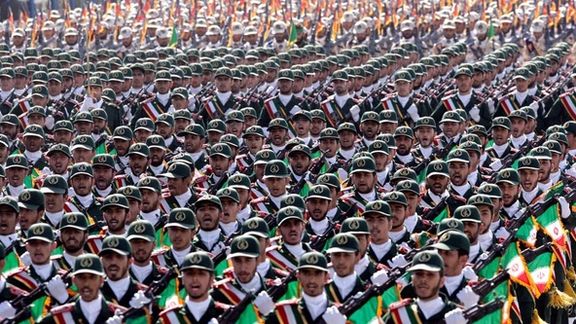
Iran’s foreign minister says EU foreign policy chief’s hints that the body would not list IRGC as a terrorist outfit proves that the bloc is not seeking to take costly measures.
Hossein Amir-Abdollahian made the remarks on Monday, hours after comments by Josep Borrell, the High Representative of the European Union for Foreign Affairs and Security Policy, who said the EU cannot list Iran's Revolutionary Guard as a terrorist entity until an EU court has determined that they are.
On Monday, Foreign Ministry spokesman Nasser Kanaani reiterated that the plan to designate the IRGC as a terror group violates the UN Charter, dismissing the European Parliament resolution as an “irresponsible and illogical” move.
Following an overwhelming vote last week, the European Parliament called on the EU to list the Revolutionary Guards as a terrorist entity, blaming it for the repression of domestic protests and the supply of drones to Russia.
"On Iran, we are going to discuss new personal sanctions according with the legal framework on human rights,” Borrell said, emphasizing that the court of an EU member had to issue a concrete legal condemnation before the EU could designate the IRGC as a terror group.
On the sidelines of the EU foreign ministers meeting in Brussels on Monday, French Foreign Minister Catherine Colonna said that “regarding the IRCG, may I remind you that they are already as a group under sanction since 2010 because of their participation in proliferation activities related to weapons of mass destruction. Now we are considering, but this is not a decision to be made today, we're considering to sanction them under another regime. We're looking closely at it and nothing is ruled out."
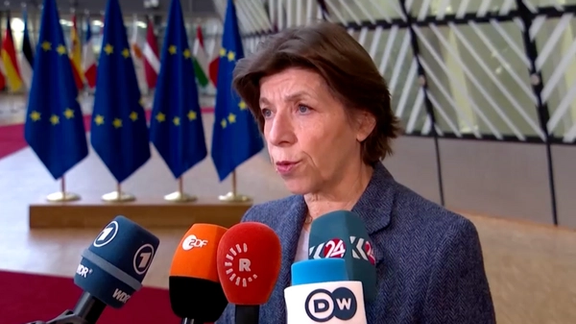
However, the EU on Monday introduced a new package of sanctions against 18 individuals and 19 entities for a "brutal" crackdown on protests, ignited by the death in custody of 22-year-old Mahsa Amini.
“Among the persons enlisted are representatives of the government and the Iranian parliament (Majles), important political and media figures, as well as high-ranking members of the Iranian security forces, including of Iran’s Islamic Revolutionary Guard Corps (IRGC),” EU said.
Restrictive EU measures now apply to a total of 164 individuals and 31 entities. They consist of an asset freeze, a travel ban to the EU, and a prohibition to make funds or economic resources available to those listed, read a statement by the EU council. “A ban on exports to Iran of equipment, which might be used for internal repression, and of equipment for monitoring telecommunications, is also in place.”
Earlier in the day, UK also sanctioned more Iranian figures over human rights violations including the recent execution of British-Iranian dual national Alireza Akbari.
In coordination with Britain and the EU, the United States imposed sanctions on IRGC’s Cooperative Foundation and senior Iranian officials on Monday, stepping up pressure on Tehran over its crackdown on protests.
Monday's action targets a "key economic pillar of the IRGC, which funds much of the regime’s brutal suppression; as well as senior security officials coordinating Tehran’s crackdown at the national and provincial levels," the US Treasury Department said in a statement.
The Treasury described the IRGC Cooperative Foundation as an economic conglomerate established by senior officials of the group to manage its investments and presence in sectors of Iran's economy. The Treasury also accused the IRGC outfit of having become "a wellspring of corruption and graft" and said funds from it have supported the IRGC's military adventures abroad.
"Along with our partners, we will continue to hold the Iranian regime accountable so long as it relies upon violence, sham trials, the execution of protestors, and other means of suppressing its people," the Treasury's Under Secretary for Terrorism and Financial Intelligence, Brian Nelson, said in the statement.
Relations between the 27-nation EU and Tehran have deteriorated during stalled efforts to revive talks on its nuclear program, worsening further as Iran has moved to detain several European nationals.
The United States has said it is not pursuing the revival of the 2015 nuclear deal, or the JCPOA, and instead its attention is on the popular movement in Iran and on Tehran’s supply of drones and missiles to Russia.
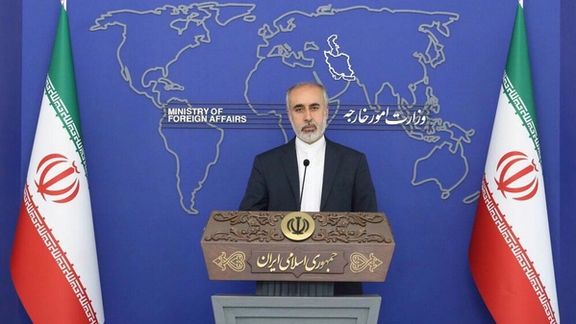
During his speech on Monday, the Iranian foreign ministry spokesman also talked about the negotiations to revive the 2015 nuclear deal, saying the absence of new rounds of talks “does not mean the absence of interaction or exchange of messages and views.” He noted that the talks serve the interests of both sides. The spokesman, however, stressed that there are no direct talks between Tehran and Washington.
As part of the threats that the Iranian officials are issuing to Europe, the country’s parliament also called on the government to retaliate against any punitive measures adopted by the EU.
Speaking on the sidelines of a closed session of the parliament on Sunday, Amir-Abdollahian said Iran can withdraw from the Treaty on the Non-Proliferation of Nuclear Weapons (NPT) and ban nuclear inspectors of the UN nuclear agency as countermeasures against the EU’s move against the IRGC.
The ties between Iran and the West have been growing increasingly sour in recent months over the regime’s human rights violations, its support for the Russian invasion of Ukraine, its uncooperative approach about the nuclear issues and its destabilizing activities across the region, and its hostage diplomacy.
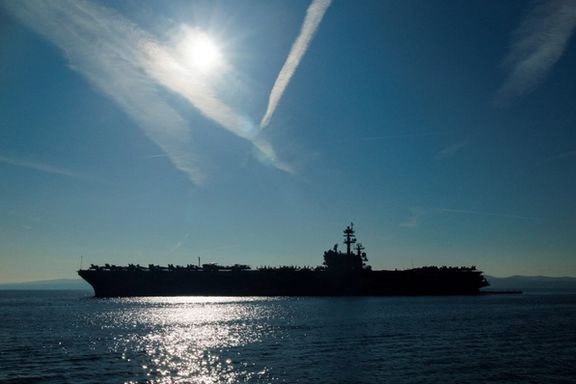
The United States and Israel Monday launched one of their biggest joint military war games, with thousands of forces, a dozen ships, and 142 aircraft, including nuclear-capable bombers.
A senior US defense official says the "Juniper Oak" exercises, which will run through Friday, are meant to demonstrate integration between the US and Israeli militaries amid growing tensions over Iran's nuclear program.
However, the US official said there would be no mockups of Iranian targets and that the exercises were not oriented around any particular adversary.
"I do think that the scale of the exercise is relevant to a whole range of scenarios, and Iran may draw certain inferences from that," the official acknowledged.
"It's really meant mostly to kick the tires on our ability to do things at this scale with the Israelis against a whole range of different threats."
The maneuvers will include live-fire exercises and involve 6,400 US forces, and Some 450 troops on the ground in Israel, the official underlined.
Drills will take place over large distances, involving land, sea, air and space, the official stated.
The planning for the exercises began only a couple of months ago, before conservative Israeli Prime Minister Benjamin Netanyahu regained top office on December 29.
The official said the drills would show how the United States could effectively surge large numbers of battle-ready forces into the Middle East, even as Washington focuses on Russia's invasion of Ukraine and intensifying competition with China.
Reporting by Reuters